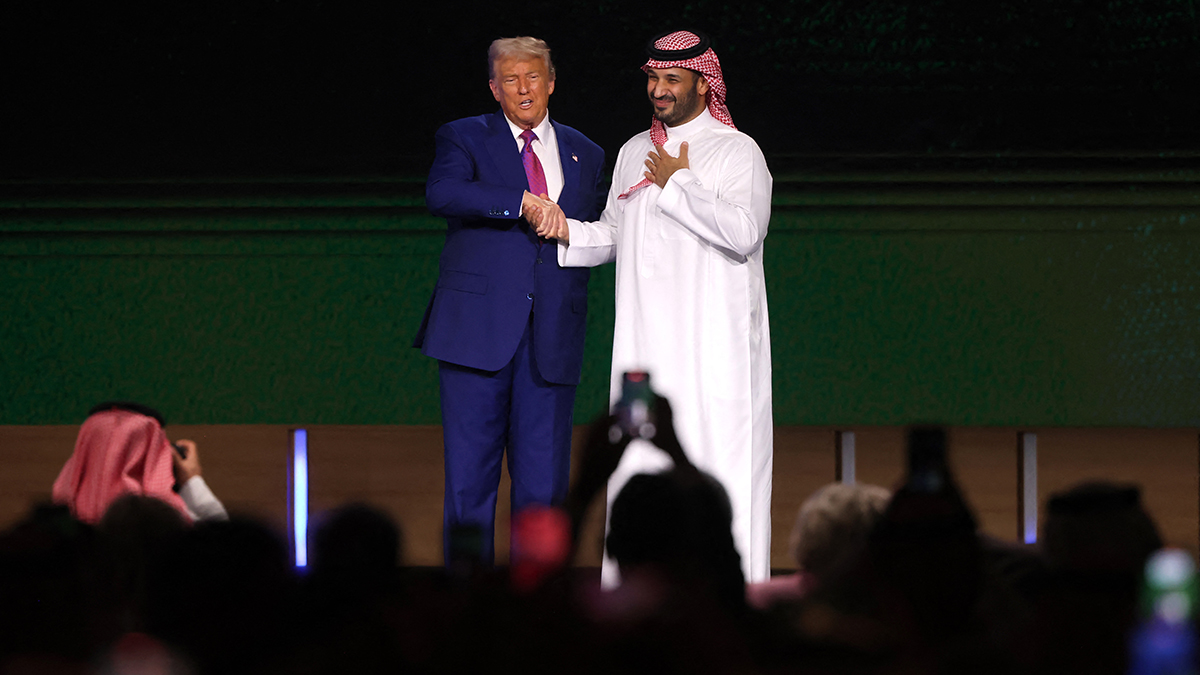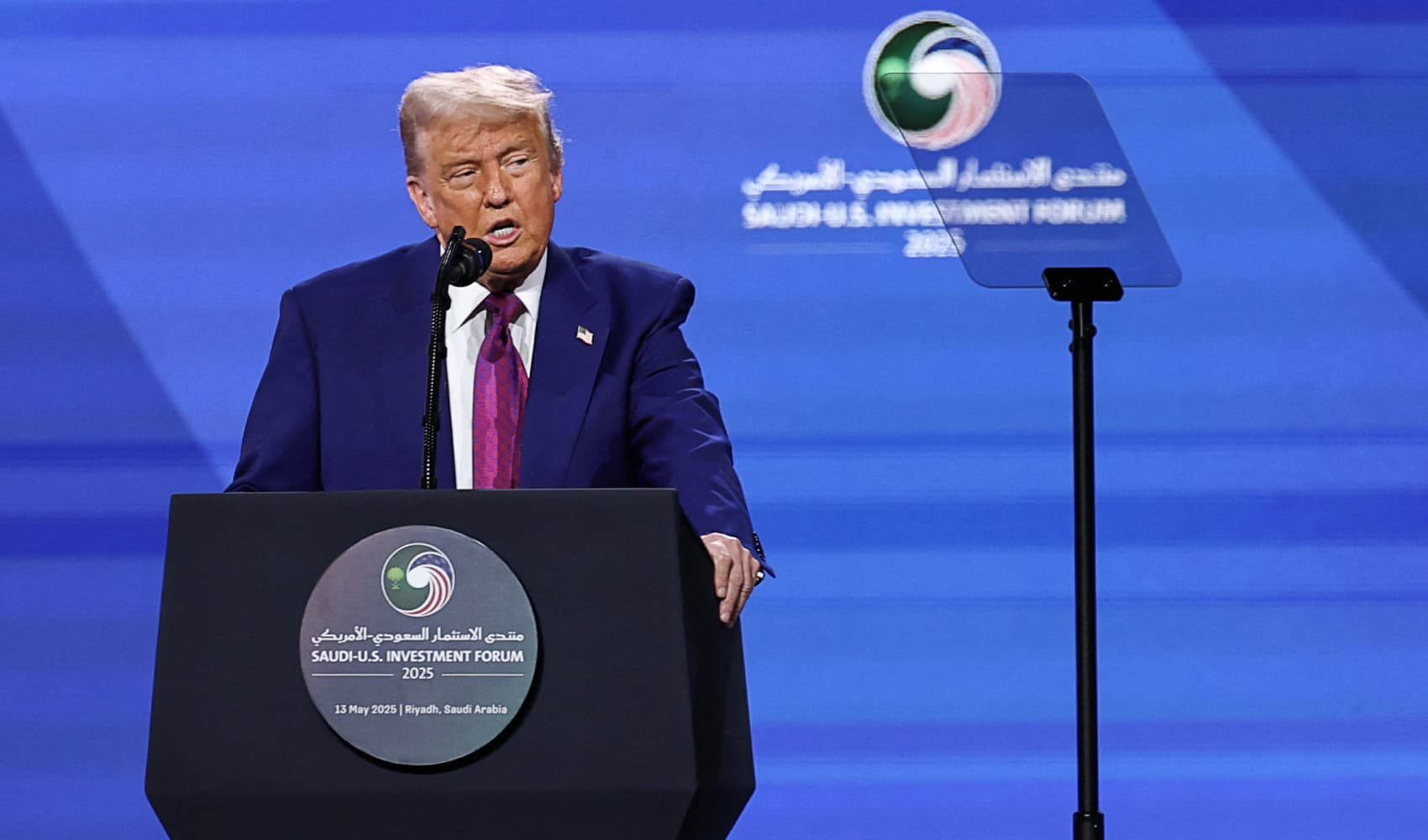Trump Lifts Syria Sanctions: $600B Saudi Deal Secured?!
Trump's Surprise in Saudi: Syria Sanctions Lifted Amid $600B US Deal!
A Diplomatic Earthquake? Trump's Bold Move in the Middle East
Well, folks, buckle up! It seems former President Trump is back in the headlines with a move that’s got everyone talking. During a recent visit to Saudi Arabia, Trump announced a rather unexpected decision: the lifting of U.S. sanctions on Syria. But that's not all! A massive $600 billion investment commitment from the Kingdom into the U.S. is also on the table. Is this a simple coincidence? Or a calculated chess move on the global stage?
The Announcement: What Went Down in Riyadh
So, what exactly did Trump say? During remarks at a business forum in Riyadh, Trump declared he was ordering an end to sanctions on Syria. He framed it as a move to help the country "seek a new start" after the presumed fall of Bashar al-Assad’s government. It’s a bold statement, considering the complex history and ongoing political dynamics in the region. Remember, this isn’t just lifting sanctions on a small town; this is a nation grappling with years of conflict and instability. Talk about making a splash!
The Saudi Connection: $600 Billion and Beyond
But wait, there's more! Trump didn’t just stop at Syria. He also showered praise on Saudi Arabia and its leaders, especially after the White House announced a commitment from the Kingdom to invest a whopping $600 billion in a series of deals with the U.S. That's right, folks, 600 BILLION! Are these two events directly linked? Some may say yes, others may say no. But you can't deny the timing is interesting. Perhaps this economic boost is meant to soften the blow of the sanctions lift, or maybe it is an honest business deal. Either way, the impact will be far-reaching.
Trump's Grand Tour: Qatar and the UAE Await
This Saudi visit isn't a one-off. It's just the beginning of a major international tour. This marks the first major international trip of Trump’s second term (in this fictional scenario), and it comes at a pivotal time for diplomacy. With U.S. officials scrambling to forge new trade deals following Trump’s recent sweeping tariffs, this trip to the Middle East is crucial. Next stops on the itinerary? Qatar and the United Arab Emirates. Could we see more unexpected announcements coming from those visits? Stay tuned, folks!
Backlash at Home: Trouble Brewing?
Of course, no Trump announcement comes without its fair share of controversy. Even amidst the excitement, Trump is already facing backlash over the administration’s… Well, we don’t have the specifics of the backlash, but you can bet it involves accusations of him being overly lenient, concerns about the timing of the decision, and of course, skepticism regarding the Saudi investment. After all, is it really *that* easy to commit $600 billion?
Sanctions on Syria: A Quick History Lesson
Let’s rewind a bit. Why were sanctions imposed on Syria in the first place? Well, primarily due to the Assad regime’s human rights abuses, support for terrorism, and the devastating civil war. These sanctions aimed to cripple the regime's ability to fund its activities and pressure it to find a peaceful resolution. But now, Trump is saying “enough is enough” and opting for a new approach. Will it work? Only time will tell.
The Potential Impacts: A Mixed Bag
Lifting sanctions on Syria could have a range of impacts, both positive and negative. On one hand, it could open doors for much-needed humanitarian aid and reconstruction efforts. The Syrian people have suffered immensely, and access to essential resources is critical. On the other hand, it could embolden the Assad regime, potentially leading to further instability and even greater human rights violations. It’s a risky gamble, no doubt.
Economic Ramifications: Who Benefits?
Economically, the lifting of sanctions could benefit various players. Syrian businesses and industries could start to rebuild, trade could resume, and investment could flow in. But don't forget about the potential for corruption and illicit activities. It’s crucial to ensure that any economic benefits reach the people who need them most, rather than just lining the pockets of the elite.
Geopolitical Implications: Shifting Alliances?
From a geopolitical perspective, this move could significantly alter the power dynamics in the Middle East. Will it strengthen or weaken U.S. influence in the region? Will it pave the way for a more stable Syria, or simply create a vacuum for other actors to fill? It could even cause a shift in alliances as other nations re-evaluate their position.
The Saudi Investment: A Game Changer for the US?
Now, let’s talk about that $600 billion investment from Saudi Arabia. If it materializes, it could provide a significant boost to the U.S. economy. This investment could create jobs, stimulate growth, and support key industries. But of course, there are concerns about the potential for Saudi Arabia to exert undue influence over U.S. policies. It’s a delicate balance between economic benefits and national security.
Reactions from Around the World: The Global Response
Unsurprisingly, the international community has reacted to Trump’s announcement with a mix of praise, condemnation, and cautious optimism. Some countries see it as a step towards peace and stability in Syria, while others view it with suspicion and concern. Expect to see a flurry of diplomatic activity as nations try to make sense of this bold move.
Critics' Concerns: Human Rights and Accountability
Critics argue that lifting sanctions without addressing the human rights situation in Syria sends the wrong message. They worry that it could normalize the Assad regime and undermine efforts to hold it accountable for its past actions. Is Trump sacrificing human rights for economic gains? It’s a valid question that deserves serious consideration.
The Future of Syria: What Lies Ahead?
What does this all mean for the future of Syria? It’s hard to say for sure. Lifting sanctions could potentially create opportunities for progress, but it also carries significant risks. Ultimately, the success of this move will depend on whether it leads to a more peaceful, stable, and inclusive Syria. The road ahead is long and uncertain, but this might just be a turning point.
The Long Game: Trump's Strategy Unveiled?
So, what’s Trump’s long game here? Is he trying to broker a new peace deal in the Middle East? Is he prioritizing economic interests over human rights concerns? Or is he simply trying to shake things up and disrupt the status quo? Whatever his motives, one thing is clear: Trump’s latest move has sent shockwaves around the world and sparked a heated debate about the future of Syria and the role of the U.S. in the region.
Final Thoughts: A New Chapter or a Risky Gamble?
Trump’s decision to lift sanctions on Syria and his strengthened ties with Saudi Arabia mark a potentially transformative moment in Middle Eastern politics. Whether this is a brave step toward peace or a dangerous gamble remains to be seen. One thing's for sure, all eyes are on Syria to see what happens next. The only certainty is that the future of this conflict-ridden region is anything but predictable.
Conclusion: Key Takeaways
To wrap it all up, Trump's unexpected announcement in Saudi Arabia has major implications. He lifted sanctions on Syria, praised Saudi Arabia, and secured a massive $600 billion investment pledge for the U.S. This comes amidst his first major international trip of his "second term" and is already generating significant backlash. The lifting of sanctions could offer opportunities for Syria’s recovery, but it also carries considerable risks. This saga is one to watch, as the ripple effects will be felt globally.
Frequently Asked Questions
-
Why did Trump decide to lift sanctions on Syria?
Trump stated the move was to help Syria "seek a new start" following the presumed fall of the Assad government. The decision likely involves complex geopolitical and economic considerations.
-
What are the potential benefits of lifting sanctions on Syria?
The move could open doors for humanitarian aid, reconstruction efforts, and economic recovery for the Syrian people.
-
What are the potential risks of lifting sanctions on Syria?
Critics worry it could embolden the Assad regime, normalize human rights abuses, and potentially destabilize the region further.
-
How significant is the $600 billion investment from Saudi Arabia to the US?
A $600 billion investment would be a significant boost to the US economy, potentially creating jobs, stimulating growth, and supporting key industries.
-
What are other countries saying about Trump's decision?
International reactions vary, with some countries cautiously optimistic and others expressing concern about the potential consequences. It's a complex situation with a wide range of viewpoints.


